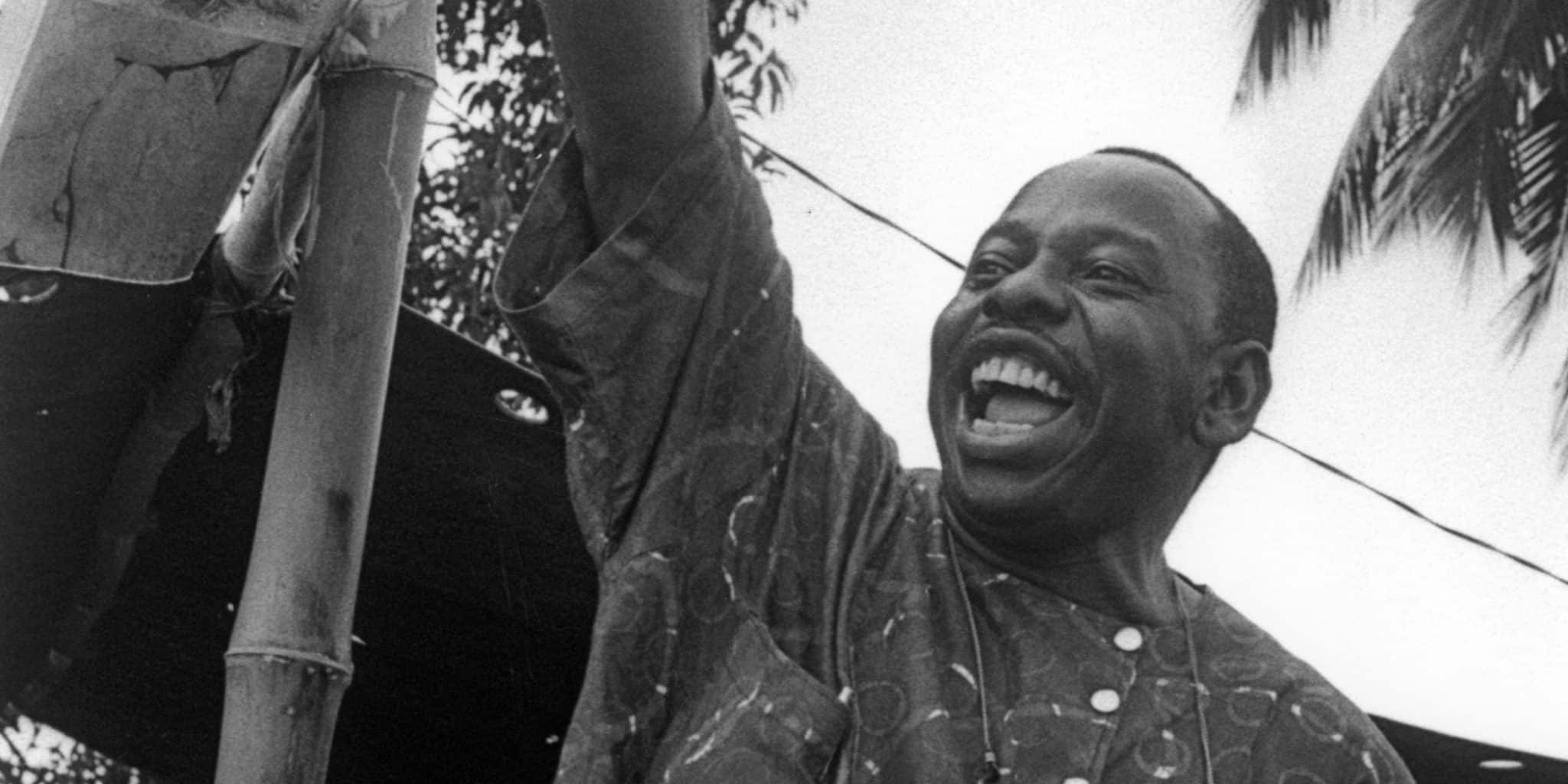Ken Saro-Wiwa was born in October 1941, the eldest son of a prominent family in Ogoni, which is today in Rivers State, Nigeria. He was executed on November 10th 1995.
After leaving university he initially pursued an academic career.
During the Biafran war (1967-1970) he was a Civilian Administrator for the Port of Bonny, near Ogoni in the Niger Delta. He went on to be a businessman, novelist and television producer. His long-running satirical TV series Basi & Co was purported to be the most watched soap opera in Africa.
Two of his best known works were drawn from his observations and experiences of the Biafran war. His most famous work, Sozaboy: a Novel in Rotten English, is a harrowing tale of a naïve village boy recruited into the army. On a Darkling Plain, is a diary of his experiences during the war.
Ken Saro-Wiwa was consistently concerned about the treatment of Ogoni within the Nigerian Federation and in 1973 was dismissed from his post as Regional Commissioner for Education in the Rivers State cabinet, for advocating greater Ogoni autonomy.
During the 1970s he built up his businesses in real estate and retail and in the 1980s concentrated on his writing, journalism and television production.
Throughout his work he often made references to the exploitation he saw around him as the oil and gas industry took riches from the beneath the feet of the poor Ogoni farmers, and in return left them polluted and disenfranchised.
In his book of short stories, Forest of Flowers (1986), the following passage from the story Night Ride, reflects Saro-Wiwa’s anger at seeing multinational oil companies, like Shell, appropriating land from local people:
‘An old woman had hobbled up to him. My son, they arrived this morning and dug up my entire farm, my only farm. They mowed down the toil of my brows, the pride of the waiting months. They say they will pay me compensation. Can they compensate me for my labours? The joy I receive when I see the vegetables sprouting, God’s revelation to me in my old age? Oh my son, what can I do?
What answer now could he give her? I’ll look into it later, he had replied tamely.
Look into it later. He could almost hate himself for telling that lie. He cursed the earth for spouting oil, black gold, they called it. And he cursed the gods for not drying the oil wells. What did it matter that millions of barrels of oil were mined and exported daily, so long as this poor woman wept those tears of despair? What could he look into later? Could he make alternate land available? And would the lawmakers revise the laws just to bring a bit more happiness to these unhappy wretches whom the search for oil had reduced to an animal existence? They ought to send the oil royalties to the men whose farms and land were despoiled and ruined. But the lawyers were in the pay of the oil companies and the government people in the pay of the lawyers and the companies. So how could he look into it later?’
In 1990, Saro-Wiwa started to dedicate himself to the amelioration of the problems of the oil producing regions of the Niger Delta. Focusing on his homeland, Ogoni, he launched a non-violent movement for social and ecological justice. In this role he attacked the oil companies and the Nigerian government accusing them of waging an ecological war against the Ogoni and precipitating the genocide of the Ogoni people. He was so effective, that by 1993 the oil companies had to pull out of Ogoni. This cost him his life.
Saro-Wiwa was arrested in 1994 after the deaths of four Ogoni chiefs at a political rally. In a trial by special tribunal that was denounced by foreign human rights groups, he was found guilty for alleged complicity in the murders. His execution by hanging, along with those of eight fellow activists, aroused international condemnation and led to calls for economic sanctions against Nigeria, which was suspended from the Commonwealth a day after the executions. Shell later announced its commitment to a natural gas project worth nearly $4 billion, one of the largest foreign investments in Nigerian history. In 2009 Shell paid $15.5 million in an out-of-court settlement intended to resolve a lawsuit brought against it in 1996 on behalf of members of Saro-Wiwa’s family and others. Shell, accused in the lawsuit of being complicit in human rights abuses in Nigeria and in the 1995 executions, denied any wrongdoing.
Join us in helping to bring reality and decency back by SUBSCRIBING to our Youtube channel: https://www.youtube.com/channel/UCQ1Ll1ylCg8U19AhNl-NoTg and SUPPORTING US where you can: Award Winning Independent Citizen Media Needs Your Help. PLEASE SUPPORT US FOR JUST £2 A MONTH https://dorseteye.com/donate/












